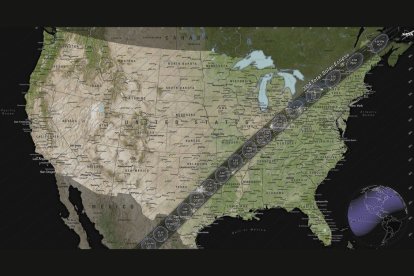Total eclipse fever, the event that will draw crowds on April 8th
The event, comparable to "20 or 30 Super Bowls happening all at once," will be visible in more than 15 states nationwide. Experts recommend avoiding traffic to enjoy it without mishaps.

(Cordon Press)
We are just days away from one of the country's most anticipated meteorological events: the total solar eclipse. The event will be visible across 15 states, starting in Texas at 1:27 pm CDT on Monday, April 8, and concluding in Maine around 3:35 p.m. EDT. The eclipse will reach its peak visibility, 4 minutes and 28 seconds, in selected areas, drawing thousands of visitors to prime viewing locations. Enthusiasts are already gearing up with special glasses to safely witness the eclipse without damaging their eyesight.
But visits also come with problems. One example of this is traffic. Richard Fienberg, project director of the Solar Eclipse Working Group of the American Astronomical Society told Time magazine that this phenomenon could be equated with celebrating "20 or 30 Super Bowls happening all at once": "Having a total solar eclipse pass through the US is kind of like having 20 or 30 Super Bowls happening all at once. So many people are gathering for the spectacle over a long distance."
The FHWA assures that the eclipse will cause a "widespread impact" on traffic
The Federal Highway Administration (FHWA) warned that traffic will have a "widespread impact" on at least 30 interstate highways. For this reason, many states began to apply security measures. In Louisiana, the governor even activated the state of emergency and also recommended traveling early.
Melissa Schleig will follow this advice. She told the New York Post, that she learned the lesson the hard way. In 2017, she drove 400 miles the day before and could hardly enjoy the event: "It should have taken us about six to seven hours to go down there but it took us about a little over six hours just to go about two hours south of here. It was insane," Schleig recalled.
Michigan photographer Beth Hutter had a similar experience. The 62-year-old woman also almost missed the 2017 eclipse when she decided to travel on the same day the phenomenon took place:
Now, they will no longer have this problem. Both learned their lesson and decided to travel early so as not to miss this total solar eclipse that will darken the American sky next Monday, April 8.
RECOMMENDATION





















